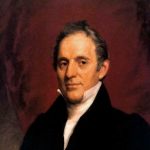In January of 1866, Baptist leaders in Virginia introduced a proposal that would integrate Southern Baptists and Disciples of Christ–Campbellites–into a single denomination.
The development stunned many Baptists in the commonwealth, but editors of the Religious Herald newspaper supported the union of the two denominations with a level of enthusiasm that captured the attention of H. H. Tucker, editor of the Christian Index in Georgia. Tucker fired an editorial volley aimed at underscoring a crucial point that Virginia editors had apparently overlooked: such a union with the Campbellites amounted to an egregious violation of Baptist doctrine and polity, particularly as it related to regenerate church membership. If the Campbellites wanted to become Baptists, each individual would have to assent to Baptist and evangelical doctrine, testify to a clear work of grace in their hearts and submit to believers’ baptism by immersion. After all, Tucker argued, to be a Baptist was to be committed to a pure church.
Religious Herald editors jousted with Tucker for several months over the proposed union, but leaders among Baptists in Virginia wisely voted to remain separate from the Disciples. In the end, Baptist ecclesiology had defeated a dangerous form of pragmatism, Tucker wrote in the aftermath. Happily, Tucker argued, Baptists in Virginia had chosen to remain faithful to their regulating principle of sola Scriptura, a principle that demanded that the church be comprised exclusively of those whose hearts had been subdued and renovated by a unilateral work of the God’s effectual grace.
Who was H. H. Tucker, and why is he an important witness to call to the stand in defense of Baptist principles?
H. H. Tucker: “The Jonathan Edwards of the South”
In his tribute to Tucker in the preface of a 1902 volume of editorials which the Georgia Baptist Convention published, Henry McDonald, Tucker’s pastor for many years in Atlanta, called his late parishioner the “Jonathan Edwards of the South.” Indeed, Tucker was Edwardsean in his ability to synthesize theology with crucial worldview-related disciplines such as philosophy, contemporary culture and religious movements of his day.
Born in Warren County Georgia in 1819, Tucker bore the namesake of his grandfather, Henry Holcombe, one of the eminent Baptist pastors in Georgia in the early nineteenth century. Holcombe was one of the founders of the Georgia Baptist Convention. Tucker spent his teen years in Philadelphia and received a classical education, graduating from Columbian College in Washington, D. C. in 1838 and for two years he practiced law in Forsyth, Georgia.
In 1948 two landmark events occurred in Tucker’s life: he married Mary Catherine West (she died a few months later and he remarried, having two children) and he abandoned his work as an attorney and surrendered to the high calling of Christian ministry. Soon, Tucker moved to Penfield, Georgia and received private theological instruction from J. L. Dagg at Mercer University. Tucker pastored for only one year and labored as a Christian educator for more than a decade. He served as president of both Mercer University and the University of Georgia, teaching theology, history, philosophy and the Bible at both schools.
While Tucker was noted as an educator, his work as editor of the Christian Index was the means by which he achieved perhaps his greatest notoriety in Georgia and across the Baptist South, a kingdom Tucker tenderly referenced in his editorials as “my Southern Zion.” Tucker spent four separate tenures as editor of the Index from 1866–just a few months after the close of the Civil War–through 1889. In 1888 Tucker bought the Index and operated it until his abrupt death in September of 1889.
While Tucker served as a pastor for a brief time, but viewed himself as a shepherd-editor at the helm of the Index, writing often on doctrine and biblical exposition. He sought to teach, rebuke and warn from the editor’s chair. Upon his death, one longtime admirer said of Tucker, “the ink that touched his pen turned to light.”
A stalwart evangelical Calvinist in the mold of Dagg, J. P. Boyce, Basil Manly, Jr., P. H. Mell and John Albert Broadus, Tucker wrote prolifically on the doctrines of grace and related topics such as divine providence. He also fed readers on a regular diet of practical divinity–prayer, family worship, sanctification–demonstrating how Christian doctrines worked out in real life. Perhaps more than any other topic, three subjects captured the attention of his pen most often, subjects which Tucker saw as intimately interrelated, subjects demanded by Baptists’ commitment to the authority and sufficiency of Scripture: regenerate church membership, the doctrine of regeneration and the pernicious threat to church purity of Finneyite revivalism.
“Our great distinguishing characteristic:” A Pure Church
Tucker argued that regenerate church membership was a logical extension of the doctrine of sola Scriptura, and he insisted that it was a doctrine that sat at the heart of the Baptist genius. The doctrine of regenerate church membership was not singled out and separated from Tucker’s theology, but was an irreducible extension of it; if the doctrines of grace were true and God had chosen to save a people, sent His Son to die as their substitute and caused them to persevere to the end, then, by logical necessity–and in fidelity to the overwhelming teaching of the New Testament–the church must be comprised of believers only. The Baptist view of the church was, in Tucker’s mind, a necessary complement to Reformed soteriology.
This doctrine rings clear from his polemic against the union of Virginia Baptists and Campbellites, in which Tucker argued that membership requirements for a Baptist church could be synthesized into a single litmus test:
“A person must first come before the church and relate his experience of grace; that is, he gives satisfactory evidence from a relation of his feelings that he has passed from death unto life and become a new creature. We cannot conceive of such a thing as a church on the New Testament model, except it be composed entirely of those who have made a credible profession of their faith; that there can be any difference of opinion on such a subject as this, is to us a strange mystery. This is our great distinguishing characteristic.”
Tucker viewed regenerate church membership as a key battleground in the war for the glory of God. Thus, one of the key doctrines that “holds all of Christianity together,” he argued, is regeneration, or the new birth.
















